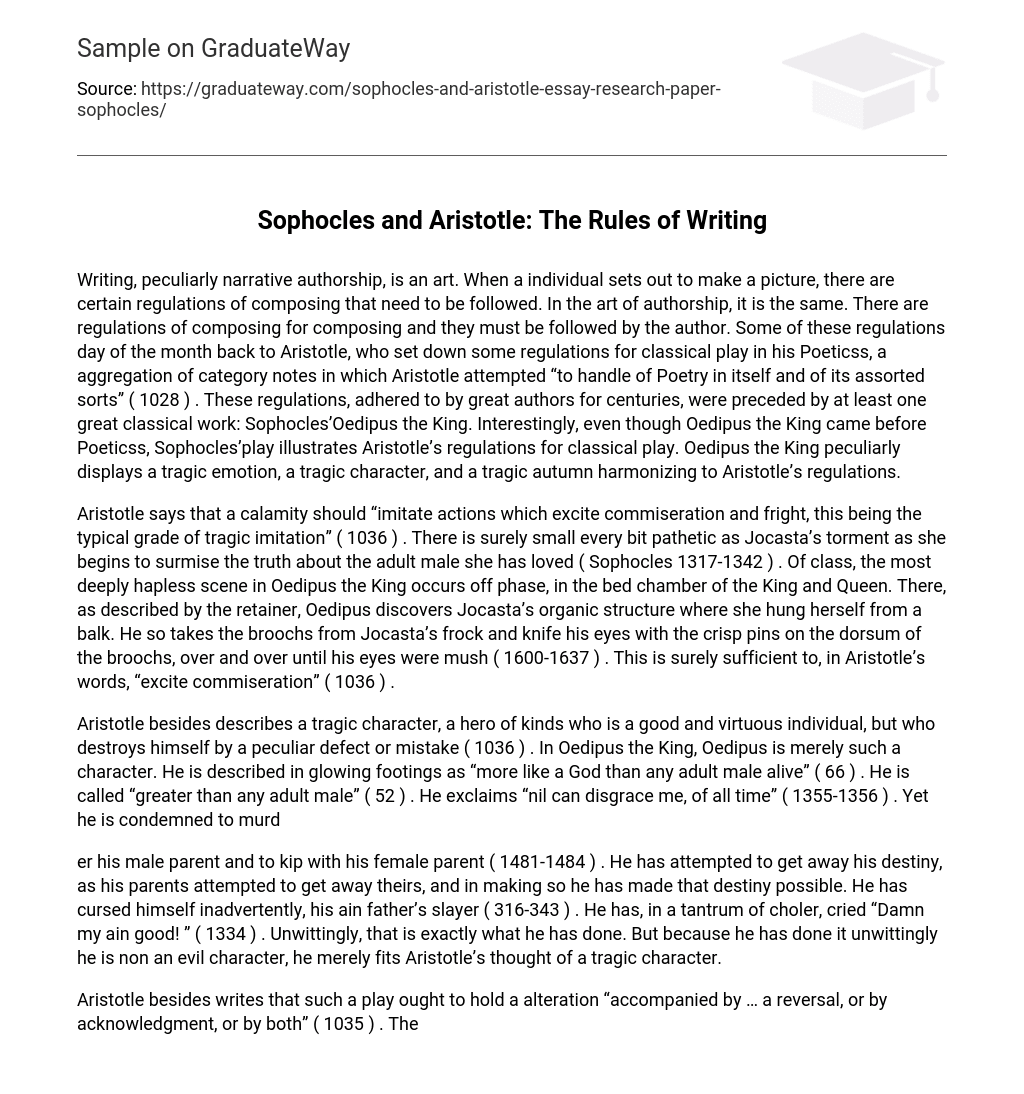Writing, peculiarly narrative authorship, is an art. When a individual sets out to make a picture, there are certain regulations of composing that need to be followed. In the art of authorship, it is the same. There are regulations of composing for composing and they must be followed by the author. Some of these regulations day of the month back to Aristotle, who set down some regulations for classical play in his Poeticss, a aggregation of category notes in which Aristotle attempted “to handle of Poetry in itself and of its assorted sorts” ( 1028 ) . These regulations, adhered to by great authors for centuries, were preceded by at least one great classical work: Sophocles’Oedipus the King. Interestingly, even though Oedipus the King came before Poeticss, Sophocles’play illustrates Aristotle’s regulations for classical play. Oedipus the King peculiarly displays a tragic emotion, a tragic character, and a tragic autumn harmonizing to Aristotle’s regulations.
Aristotle says that a calamity should “imitate actions which excite commiseration and fright, this being the typical grade of tragic imitation” ( 1036 ) . There is surely small every bit pathetic as Jocasta’s torment as she begins to surmise the truth about the adult male she has loved ( Sophocles 1317-1342 ) . Of class, the most deeply hapless scene in Oedipus the King occurs off phase, in the bed chamber of the King and Queen. There, as described by the retainer, Oedipus discovers Jocasta’s organic structure where she hung herself from a balk. He so takes the broochs from Jocasta’s frock and knife his eyes with the crisp pins on the dorsum of the broochs, over and over until his eyes were mush ( 1600-1637 ) . This is surely sufficient to, in Aristotle’s words, “excite commiseration” ( 1036 ) .
Aristotle besides describes a tragic character, a hero of kinds who is a good and virtuous individual, but who destroys himself by a peculiar defect or mistake ( 1036 ) . In Oedipus the King, Oedipus is merely such a character. He is described in glowing footings as “more like a God than any adult male alive” ( 66 ) . He is called “greater than any adult male” ( 52 ) . He exclaims “nil can disgrace me, of all time” ( 1355-1356 ) . Yet he is condemned to murd
er his male parent and to kip with his female parent ( 1481-1484 ) . He has attempted to get away his destiny, as his parents attempted to get away theirs, and in making so he has made that destiny possible. He has cursed himself inadvertently, his ain father’s slayer ( 316-343 ) . He has, in a tantrum of choler, cried “Damn my ain good! ” ( 1334 ) . Unwittingly, that is exactly what he has done. But because he has done it unwittingly he is non an evil character, he merely fits Aristotle’s thought of a tragic character.
Aristotle besides writes that such a play ought to hold a alteration “accompanied by … a reversal, or by acknowledgment, or by both” ( 1035 ) . The alteration in Oedipus the King is evidently Oedipus’autumn from a place of power and regard to a hapless blind cripple. It is, as Aristotle says it should be, a alteration “non from bad to good, but, reversely, from good to bad” ( 1037 ) .
The alteration in Oedipus the King is, as Aristotle says it should be, accompanied by a reversal and a acknowledgment ( 1035 ) . The reversal occurs when the courier comes to alleviate Oedipus of his frights of the expletive, but his disclosure that Oedipus isn’t Polybos’boy causes Oedipus to recognize his guilt alternatively ( 1187-1312 ) . The acknowledgment occurs when Oedipus recognizes Jocasta, the adult female he loves, as his female parent and the adult male that he killed as his male parent ( 1478-1484 ) . This fulfills Aristotle’s ideal of a alteration, a reversal, and a acknowledgment.
As shown by these illustrations, Oedipus the King illustrates Aristotle’s regulations for classical play. Although Oedipus the King came before Aristotle’s Poetics, it still holds to the same rules. Possibly the truest regulations for the art of composing were there before Poeticss, or before any such set of regulations was written out. Possibly the regulations are set into the manner the human head plants. Nevertheless, Aristotle’s Poetics is a dependable usher, and one that the great classics follow, irrespective of which came foremost.
- Aristotle. Poetics. Literature of the Western universe. Ed. D. Anthony English. New York: Macmillan Publishing Company, 1992. 1028-1043.
- Sophocles. Oedipus the King. Literature of the Western universe. Ed. D. Anthony English. New York: Macmillan Publishing Company, 1992. 719-767.





